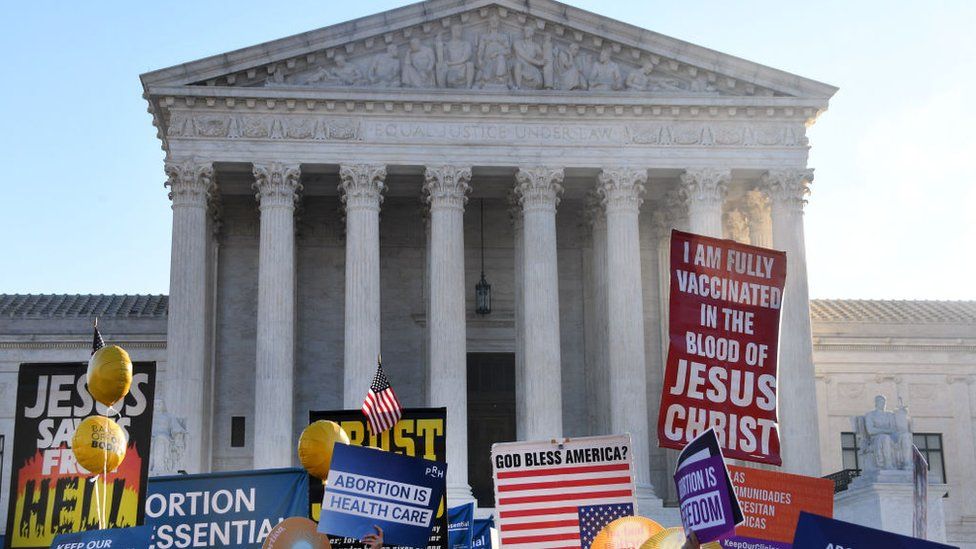Top US judges signal support for abortion limits
Anti-abortion activists are urging the court to “protect unborn children”, but experts warn of an increase in maternal mortality if abortion is restricted.

The US Supreme Court appears poised to accept a Mississippi law that would bar abortions after 15 weeks of pregnancy, even in cases of rape or incest.
In Wednesday’s hearing into the case, conservative justices hinted that a majority backed upholding the law.
A ruling, expected in June, may see millions of women lose abortion access.
Anti-abortion activists are urging the court to “protect unborn children”, but experts warn of an increase in maternal mortality if abortion is restricted.
Both sides of the debate regard this case, known as Dobbs v Jackson Women’s Health Organization, as an all-or-nothing fight over abortion rights.
Lawyers defending the Mississippi law have asked the court to overturn two previous landmark decisions regarding abortion.
The first, 1973’s Roe v Wade, gave women in the US an absolute right to an abortion in the first three months of pregnancy, and limited rights in the second trimester.
In 1992, in Planned Parenthood v Casey, the court ruled that states could not place an “undue burden” on women seeking abortions before a foetus could survive outside the womb, at about 24 weeks.
In the years since, the “foetal viability” standard has acted as a red line in abortion law, preventing any bans on abortion before this time.
But anti-abortion campaigners hope the current ideological makeup of the court has created a new opening. The court, reshaped by three appointments under former President Donald Trump, has been called the most conservative-leaning in modern US history.
What did the court hear?
Addressing the court on Wednesday – with its 6-to-3 conservative majority – Mississippi Solicitor General Scott Stewart told justices that past rulings Roe and Casey “haunt our country” and “poison the law”.
He took direct aim at the existing foetal viability standard, arguing it was not “tethered” to the Constitution.
Justice Sonya Sotomayor, a liberal, took issue with this claim, responding: “There’s so much that’s not in the Constitution”.
She warned that the court “would not recover” if Americans saw it as a political body, stepping in to reverse Roe and Casey.
The court would not “survive the stench that this creates in the public perception.”
Justice Sotomayor also questioned whether a foetus could feel pain before 24 weeks.
Mr Stewart spoke of “an unborn life being poked and then recoiling in the way one of us would recoil”.
Justice Sotomayor said that in 40% of dead people, their feet will recoil if touched. She also noted that brain dead people can respond to stimuli.
“So I don’t think that a response to… by a foetus necessarily proves that there’s a sensation of pain or that there’s consciousness,” she added.
Representing Jackson Women’s Health Organization – the only abortion clinic in Mississippi – Julie Rikelman of the Center for Reproductive Rights spoke next, asking the court to strike down the Mississippi law.
“Mississippi’s ban on abortion, two months before viability, is flatly unconstitutional under decades of precedent,” Ms Rickelman said. Mississippi’s law would “force women to remain pregnant and give birth against their will”.


